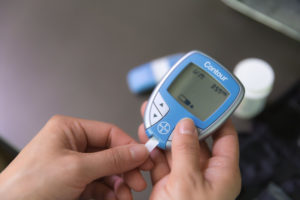
People who have diabetes know how important it is to prevent high blood sugar. According to the Centers for Disease Control and Prevention (CDC), about 13% of American adults live with diabetes (both type 1 and type 2), and 34.5% have prediabetes. Of the 13% of adults with diabetes, 90 to 95% have type 2, which is diabetes that develops due to poor nutrition and lifestyle habits. Here are some tips to help lower your blood sugar.
What Are The Risks of High Blood Sugar?
High blood sugar, or hyperglycemia, can cause many problems in people with diabetes. Mayo Clinic reports that complications from high blood sugar in people with diabetes include heart disease, nerve damage, damage to the eyes, bone and joint problems, and infections to the teeth and gums.
Manage Your Carbohydrate Intake
Controlling carbohydrate intake is one of the most important ways to prevent high blood sugar in people with diabetes. According to the American Diabetes Association, people with diabetes should learn to count their carbohydrate intake carefully.
Carbohydrates exist in three forms: sugar (simple such as table sugar), fiber, and starch (complex such as bread). Counting your carbohydrates means considering all three kinds, but your main focus is starch and sugar. The nutritional information label on your food packaging can help determine the number of carbohydrates in packaged foods.
Eat More Fiber
Of the three types of carbohydrates, fiber is the most useful for diabetes. Research has shown that dietary fiber helps control and slow down sugar digestion and absorption by the body. In other words, fiber contributes to a more even level of sugar in your bloodstream throughout the day, thus avoiding the quick spikes typical of highly refined sugars.
Exercise Regularly
Research suggests that exercise is an excellent way to lower blood sugar in people with type 2 diabetes. Exercise improves insulin sensitivity, uses up dietary carbohydrates, and makes you healthier generally. Increased insulin sensitivity means that your body can better use up the blood sugar present in your blood.
Since a sedentary lifestyle contributes to type 2 diabetes, keeping a regular exercise schedule can help with the symptoms and keep your entire body healthier.
Drink More Water
Instead of grabbing a sugary drink, researchers and physicians suggest drinking more water. According to studies, people who drank water before a meal had lower blood sugar than people who did not drink water. Moreover, people who drink water regularly have a generally lower risk of suffering from diabetes in the first place!
Reduce Stress in Your Life
There seems to be a link between type 2 diabetes and chronic stress. Research studies show a link between stress levels and high blood sugar. When you are stressed, the hormones cortisol and glucagon increase in your bloodstream, contributing to your blood sugar level spikes.
Get Enough Sleep
Just like with stress, lack of adequate sleep increases the cortisol levels in your blood, which increases your blood sugar, according to research. Low-quality sleep is linked to an increased risk of obesity and diabetes so getting enough high-quality sleep is essential for lowering and controlling your blood sugar.
Monitor Your Blood Sugar
The best way to control your blood sugar is to monitor it regularly. Simply Medical has all the diabetes supplies you need to know the effect of food, sleep, and exercise on your blood sugar.

